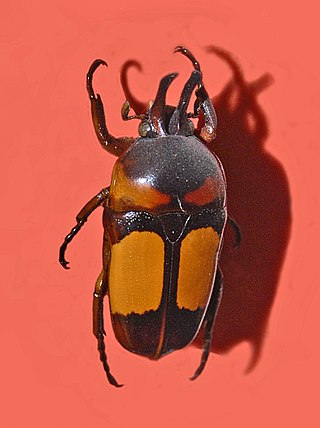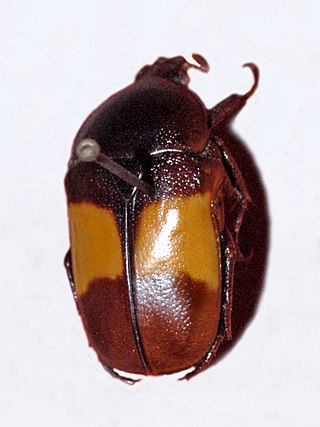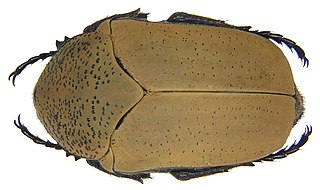
Elettaria is a genus of flowering plants in the family Zingiberaceae. They are native to India and Sri Lanka, but cultivated and naturalized elsewhere. One member of the genus, E. cardamomum, is a commercially important spice used as a flavouring agent in many countries.

Flower chafers are a group of scarab beetles comprising the subfamily Cetoniinae. Many species are diurnal and visit flowers for pollen and nectar, or to browse on the petals. Some species also feed on fruit. The group is also called fruit and flower chafers, flower beetles and flower scarabs. There are around 4,000 species, many of them still undescribed.

Dorcus is a genus of beetles in the stag beetle family Lucanidae. Of the over 100 species, most occur in Asia and India; two are found in southern Europe, and two species are from North America. Previously, specimens with serriform teeth on the mandibles and sable pigment were called Serrognathus whereas specimens with but a singular or multiple bulky notches on the mandibles and lustrous sable pigmentation were called Dorcus.

The Atlas beetle is a very large species of beetle in the family Scarabaeidae, found in Southeast Asia. Males have three prominent horns. The species is named for Atlas, the giant of Greek mythology who supported the skies.

Xylotrupes is a genus of rhinoceros beetles, with more than 25 species and subspecies distributed worldwide, but especially in Asia.

Therates is a genus of tiger beetles found in South and Southeast Asia. A study of two species in the Philippines suggests that females tend to be larger with wider elytra width.
Oxycentrus is a genus in the beetle family Carabidae. There are more than 60 described species in Oxycentrus.

Caelostomus is a genus of beetles in the family Carabidae. It contains the following species:

Nealcidion is a genus of beetles in the family Cerambycidae, containing the following species:

Aegomorphus is a large genus of beetles in the family Cerambycidae.

Neocerambyx is a genus of round-necked longhorn beetles of the subfamily Cerambycinae. There are more than 20 species of Neocerambyx, found in South, Southeast, and East Asia.

Dicheros bicornis is a species of beetles belonging to the family Scarabaeidae, subfamily Cetoniinae.

Chondrorrhina abbreviata is a species of fruit and flower chafers belonging to the family Scarabaeidae, subfamily Cetoniinae.
Theodosia rodorigezi is a scarab beetle in the subfamily Cetoniinae found in the island of Palawan, Philippines. The male is a beautiful iridescent green.

Hologymnetis is a genus of fruit and flower chafers in the family Scarabaeidae. There are about eight described species in the genus Hologymnetis.

Gymnetini is a tribe of fruit and flower chafers in the family Scarabaeidae. According to Catalogue of Life (2023), there are 32 genera in Gymnetini, mostly New World.

Cetoniini is a tribe of fruit and flower chafers in the family of beetles known as Scarabaeidae. There are over 80 genera in Cetoniini, found worldwide.

Trigonopeltastes is a genus of fruit and flower chafers in the beetle family Scarabaeidae, found in North and Central America. There are more than 20 described species in Trigonopeltastes.
Campsiura nigripennis, is a species of dung beetle found in India, Sri Lanka, Myanmar, Malaysia, Indonesia, Thailand and Vietnam.

Ixorida is a genus of flower chafers. There are about 10 species, all from tropical Asia.

















